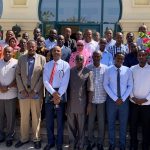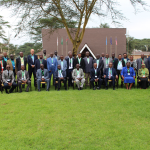IGAD region is home to about 17,506,106 camels contributing over 51% of the world population. However, camel potential is affected by increased frequency of drought due to climate change, undiagnosed disease that causes sudden death and other trans-boundary animal diseases like camel pox, pests, limited knowledge and skills on camel husbandry by extension staff and limited value addition on camel milk, meat and hides. A regional workshop was organized to review the current status of camel production and marketing; good practices and lessons learnt from past investments and challenges that affect the value chain. Workshop participants included veterinary technical personnel from ministries responsible of animal resources, the private sector (milk processors, exporter and association), research institutions (ILRI and KALRO), non-governmental organizations (Mercy Corps, World vision, Save the Children and USAID).
Dr. Obadiah Njagi, the Chief Veterinary Officer (CVO), Kenya, opened the workshop. He reiterated the importance of camels in the ASALs of IGAD region. They greatly contribute to pastoral resilience bearing in mind climate change that has led to increased frequency of drought in the region. As such, camels are affected by inadequate fodder and water in addition to a number of unrecognized diseases, However, through IGAD effort, grades and standards of live camels were developed to promote trade. Countries should focus on value addition in camel products like milk, meat and hides that is poorly developed. Welcome remarks were also made by Dr. Solomon Munyua, the Director of ICPALD.
Recommendations and way forward
- IGAD should support the development of a regional camel development policy and strategy for domestication by member states
- Member states should support capacity development in camel health and husbandry practices by liaising with training institutions to include modules on camels in their training curriculum (certificate, diploma and degree) and strengthen extension service
- IGAD, research institutions, development partners (donors and implementing) and member states should support research efforts involving community participation to promote breeding programmes, unravel/ mitigate undiagnosed camel diseases , among others to improve camel productivity and health service delivery
- IGAD should support the development of a regional camel forum (as a sub-network of regional animal health network) incorporating all interest groups in camel issues for sharing good practices, challenges, lessons learned, research findings, market needs and for networking
- Member states, development partners and IGAD should support value addition in live camels and camel core (milk & meat) & by- (hides, bones [necklaces, key holders] etc) products along the value chain and strengthen market linkages to minimize informal trade,
- Member states, development partners and IGAD should support rangeland improvement through rehabilitation, develop standard operating guidelines and strengthen governance structures to mitigate effects of drought, climate change, land degradation and invasive weeds encroachment,
- Member states and IGAD should develop bankable proposals and seek for willing development partners to finance camel development projects at national and regional levels
ICPALD acknowledges and appreciates to the RPLRP project /World Bank for funding this activity






